Larks and Owls – Why Waking Early May Not Be Best For You
Key Points:
- Morning birds (larks) are more productive earlier in the day, whereas night owls are more creative and productive later in the day.
- Whether you’re a lark or an owl (your chronotype) is determined largely by your genetics.
- Both larks and owls are highly productive when they follow a schedule that makes best use of their productive hours, and minimizes unproductive hours.
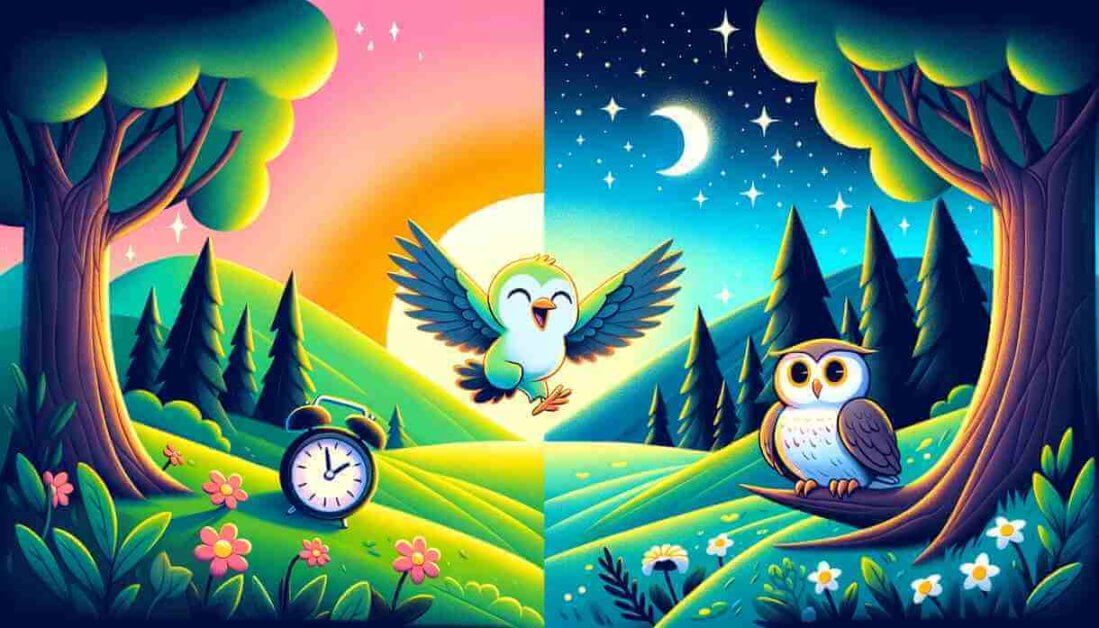
Jump to:
While Tim Cook, the mild-mannered and introverted CEO of Apple, and Donald Trump, a wild-mannered extrovert, may not seem to have much in common, they are both part of an elite group of CEOs and business leaders who wake around 4 am.
Unsurprisingly, the rest of the world who strive to follow in their footsteps try to emulate this routine, with the majority of self-improvement-focused bloggers and YouTubers preaching the benefits of waking up and starting the day early.
But is this morning lark routine truly the path to productivity and success? Or is it a quick and painful route to mental exhaustion?
The answer may lie in your genetics. Whether you are a “morning bird” or a “night owl” was somewhat decided before you were even born.
This article will explore the differences between morning and evening people (chronotypes), which one you may be, and how you should build your daily routine around the times that are most productive for you. You may be surprised to learn that early is not always best.
Early Birds Vs Night Owls
The early bird catches the worm, as the saying goes. Early birds are praised for their efforts in getting up early and getting things done. Night owls, on the other hand, are notorious for working more productively later on when the rest struggle to stay awake.
There is no clear consensus on what percentage of people are morning people versus evening people, as it can vary depending on how these terms are defined and measured.
One study by the University of Madrid found that around 47% of participants were morning people, 24% were evening people, and 29% fell somewhere in between.
Another study published in the Journal of Personality and Social Psychology found that around 40-50% of people were morning people, while 30-40% were evening people.
While studies usually indicate that a slightly higher proportion of people lean more toward early birds, the split is often close to 50/50.
Why are Some Early Birds While Others are Night Owls?
Although scientists are not entirely clear why sleep-wake cycles differ, one popular theory is that chronotypes may have developed as a way for humans to protect themselves from predators.
In the early days of human evolution, humans likely needed to take turns staying awake to protect themselves from predators during the night. This may have led to the development of different sleep-wake patterns among different individuals, with some individuals naturally preferring to stay awake later and others favoring waking up earlier.
A second theory is that chronotypes may have developed as a way for early humans to take advantage of different resources at different times of the day.
For example, morning people may have been better suited for tasks that required high energy and focus in the morning, while evening people may have been better suited for activities that required more creativity and flexibility later on.
Both theories allude to nature’s evolutionary drive for efficiency, ultimately increasing the survival rate of the species.
Which is Best?
A trick question, of course; no single early bird can be said to be better than a night owl.
If the aforementioned evolutionary reasonings for chronotypes prove to be correct, then both morning larks and night owls hold different but equally important roles for society as a whole.
Unfortunately, modern society has progressed far quicker than the body and brain can keep up. Mandatory and inflexible work schedules, such as the dreaded 9-5, have made life more uncomfortable for night owls who are forced to wake early against the grain of their natural sleep-wake cycle.
Chronotypes and Productivity
Being a night owl or a morning lark isn’t just about the times you wake and sleep, it’s also about your optimal time of functioning. Larks tend to have more energy and productivity earlier in the day, while owls function better later on.
We all have 24 hours in a day, so whether you wake up at 6 am or 10 am matters little when we all have the same amount of waking hours; what matters is how productively each hour is spent.
Differences Between Morning Birds and Night Owls
1) Health
Of all the research conducted on the differences between larks and owls, perhaps the most significant is the effect on health.
Recent research suggests owls are more likely than larks to experience symptoms of depression, seasonal affective disorder, and substance abuse problems.
The discrepancy between chronotype and modern working hours, known as social jet lag, makes owls more susceptible to picking up unhealthy habits as they are forced to wake, sleep, and work earlier than their bodies are comfortable with.
Thus, night owls are at higher risk for health issues resulting from poor sleep, such as obesity, diabetes, heart disease, and addictive behaviors, simply because they are forced to conform to a sleep-wake cycle against their body’s preferences.
Similarly, a 2010 survey of nearly 4,000 people in Canada found that self-identified night owls were more likely to have vivid, severe nightmares, independent of age and sleep duration.
2) Happiness
Research has also shown an association between morning birds and greater happiness.
This study of hundreds of medical students conducted at Dokuz Eylul University in Turkey correlated higher scores in morningness (a self-reported preference for waking and working early) with higher scores on a questionnaire measurement of happiness.
3) Creativity
Despite research showing lowered levels of happiness and health, night owls consistently rank higher than larks in tests for creativity.
This study surveyed around 500 students to examine if there were any differences between self-confidence in one’s creative ability and the preference for a particular time of day.
The results reveal that 58% of art students have more confidence in their creative ability after 10 pm compared to 29% of management students.
One report even goes as far as correlating higher average IQs with self-described night owls, although the study leaves plenty of room for interpretation.
The Short-Sleeping Gene
We spend about a third of our lives sleeping; any reduction in the hours needed to get a full night’s rest would therefore be an extremely valuable superpower.
Yet this is exactly what a team led by Dr. Ying-Hui Fu and Dr. Louis Ptáček at the University of California, San Francisco discovered in a study about a family with three generations of naturally short sleepers.
They discovered that a specific gene mutation resulted in a full rest cycle of only 6.25 hours per night, as opposed to the average of 8.06 hours for the rest of us mere mortals.
Using whole exome genome sequencing, the researchers found the rare mutation in the ADRB1 gene that passed through the family genes.
To learn more about the mutation’s effects on the brain, the researchers created genetically engineered mice with the altered gene. The mice slept almost an hour less each day compared to normal mice, having had about seven minutes less REM sleep and 53 minutes less non-REM sleep.
These lucky short-sleeping minority experience better sleep quality and efficiency, reducing the total sleep time without compromise.
In fact, contrary to the majority where fewer hours of sleep results in increased medical issues, natural short sleepers actually seem to benefit from this genetic quirk, having found them to be more optimistic, energetic, and better multitaskers.
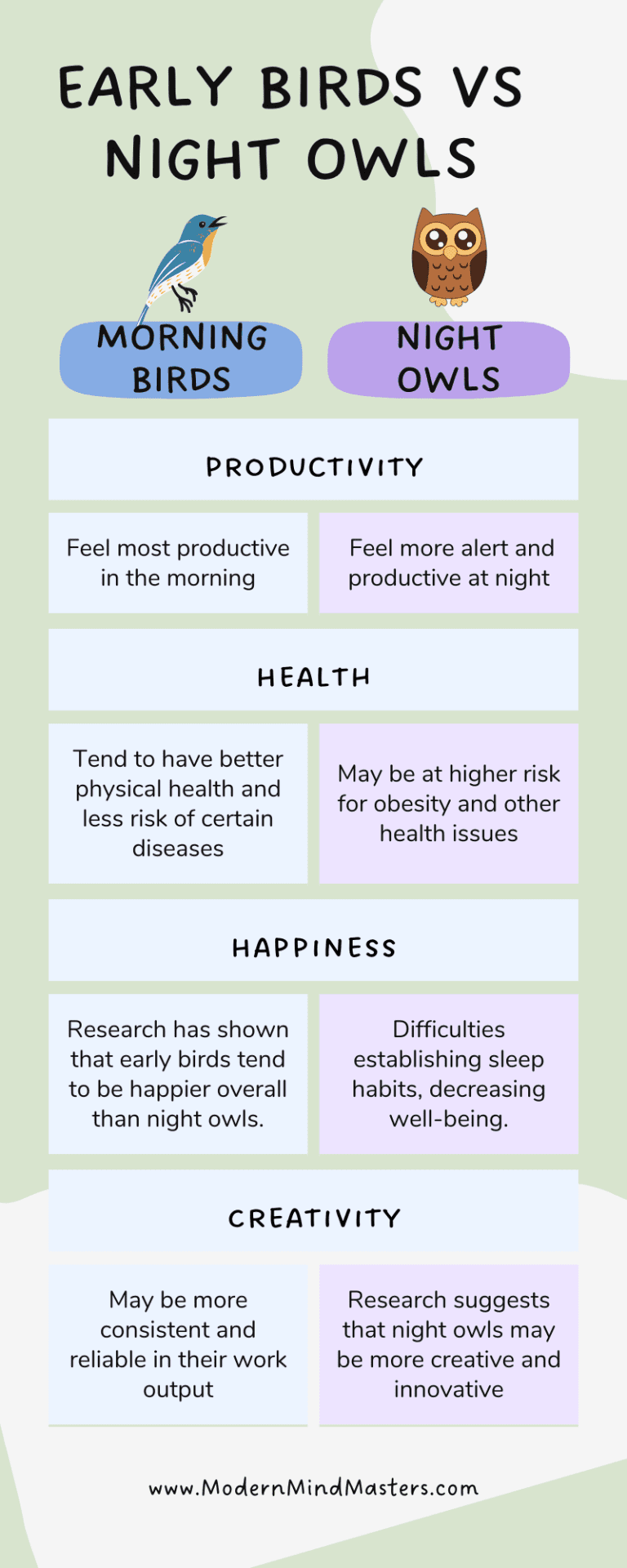
Sleep Quality Differs per Person
Whether an owl or a lark, one’s chronotype dictates only when we sleep, not how well. While only a very few possess the ability to short-sleep, the rest of us rely on obtaining enough hours.
On average, adults require 7 to 9 hours, children 9 to 13, and babies a whopping 12 to 17.
But one person’s 8 hours of sleep is likely not the same as another’s. The quality of sleep, that is, how much deep sleep you obtain, is vital, and it depends largely on the proportion of sleep spent in the REM stage.
REM (Rapid Eye Movement) sleep occurs cyclically throughout the night and is characterized by rapid eye movements, muscle paralysis, and vivid dreaming. It is the phase of sleep believed to play a crucial role in various cognitive and physiological processes, such as memory consolidation and learning.
REM sleep is also when the body and brain are repaired, restored, and rejuvenated, and vitally important for healthy brain functioning.
On average, adults spend 20% of their total sleep time in the REM phase; babies, by comparison, tend to spend closer to 50% due to the large amount of learning and wiring in the brain during these early years.
Short-sleepers, unsurprisingly, spend a larger portion of their sleep in the REM phase.
While the proportion of time spent in REM sleep can vary based on environmental factors (obesity, for example, increases the force on the airway, leading to snoring and struggling for breath), it is also partly based on genetics; some people naturally spend more time in the REM phase, hence the variability in sleep needs for different people.
Sleep quality also changes over time; 40% of people over 60 experience some form of insomnia.
Insomnia can even vary between genders; more than one in four women in the United States experience insomnia, compared with fewer than one in five men.
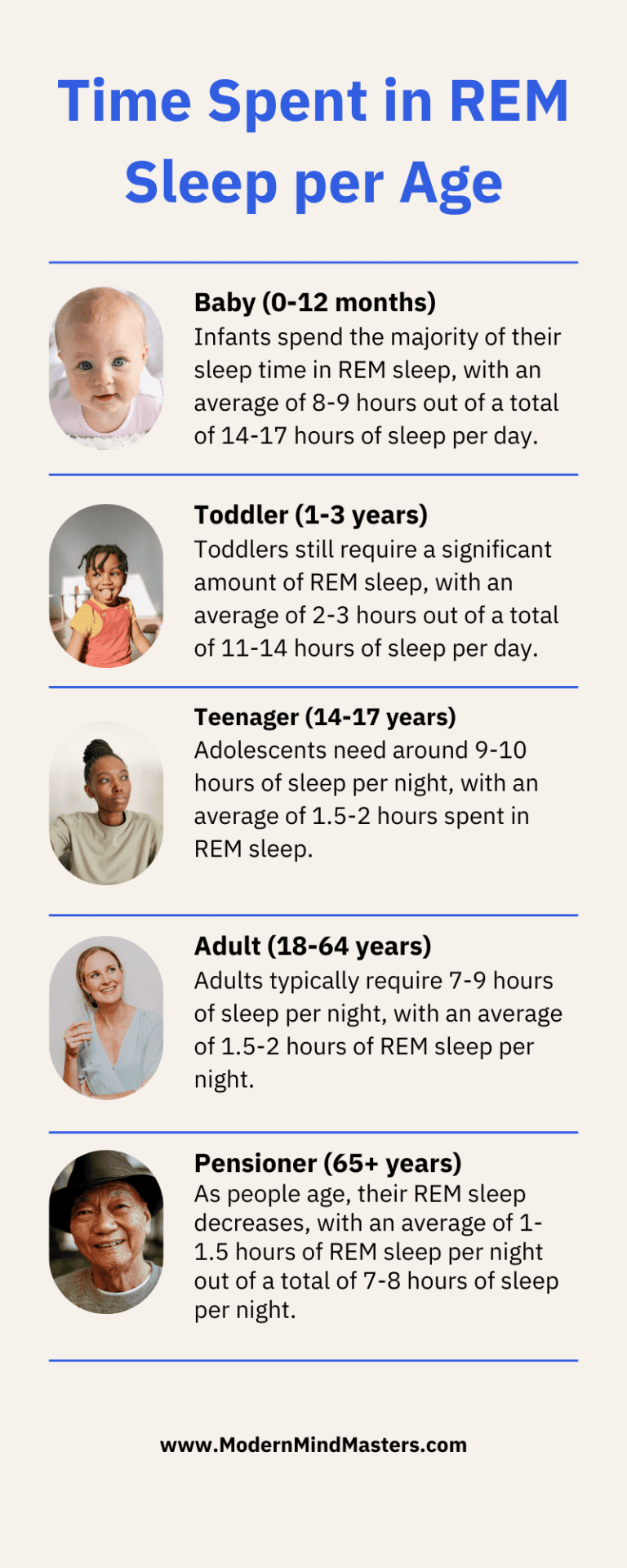
Sleeping Habits of Famous People
With so much variability surrounding sleep schedules, it might be beneficial to study the sleep schedules of the successful.
A few notable businessmen form part of the “Sleepless Elite” – those who function on 4-6 hours of sleep. These include Donald Trump, who reportedly sleeps between 1 – 4 am, Richard Branson (12 pm – 5 am), and Elon Musk (1 am – 7 am). These lucky few likely have the short-sleeping gene to some degree, enabling them to sustain this schedule.
Others, including LeBron James, who sleeps around 12 hours per day, and Floyd Mayweather, at 8 – 10 hours, require more time to recover from their demanding training schedules. Most athletes note that sleeping hard is just as important as training hard – burnout and muscle fatigue will quickly limit their performance.
While many notable businessmen are early birds, a significant proportion are clear night owls who prefer to work when the rest of the world is unwinding and preparing for bed.
Obama was one classic example, who frequently worked until 2 am. Sigmund Freud, a pioneer of psychoanalysis, was another night owl who did most of his work from 3 pm to 9 pm and then from 11 am to 1 pm.
As you can see, sleep schedules and durations vary greatly based on the individual. While the majority seem to be early birds, a significant proportion make their preference for later functioning work for them.
The Key to Success
As you can see, there is no one-size-fits-all approach to sleep that can be said to be better than another.
The key, therefore, is making your natural preferences work for you. We all have the same number of hours in the day; the difference between time well spent and time wasted, therefore, is how productively each hour is spent.
Since we cannot (yet) modify our sleep-related genetics, we are left with how to best maximize what is within our control.
Identify whether you tilt more towards a night owl or a morning lark. Remember, there is no right or wrong; although morning larks tend to fit into the typical 9-5 work schedule easier, they suffer from low energy and productivity in their free time after work.
If you are more of a night owl, maximize your afternoon time (where possible) to perform your most important work. We often have little control over our corporate work schedules, but at least being mindful of your ideal times will help you better plan activities where possible.
Final Thoughts
The best sleep schedule is the one that maximizes your available waking hours. While some are clear early birds, preferring to sleep, wake and work earlier, night owls would soon burn out and become inefficient following the same schedule.
If this sounds like you, and your preference is to sleep and wake later, maximize this time as far as possible. Unfortunately, modern societal norms force the majority into an early bird schedule, so it is up to you to make your time work for you as far as possible.
In truth, absolute morning- or evening-oriented people are rare; most fall somewhere in the middle. As a result, we have to plan our work around our most productive hours.
But remember, whether you’re a night owl or an early bird, we all have one thing in common: we hate the sound of our alarm clocks in the morning.
FAQs
Early birds are praised for their efforts in getting up early and getting things done. Night owls, on the other hand, are notorious for working more productively later on when the rest struggle to stay awake.
Being a night owl or a morning lark isn’t just about the times you wake and sleep, it’s also about your optimal time of functioning. Larks tend to have more energy and productivity earlier in the day, while owls function better later on.
We all have 24 hours in a day, so whether you wake up at 6 am or 10 am matters little when we all have the same amount of waking hours; what matters is how productively each hour is spent.
Since we cannot (yet) modify our sleep-related genetics, we are left with how to best maximize what is within our control.
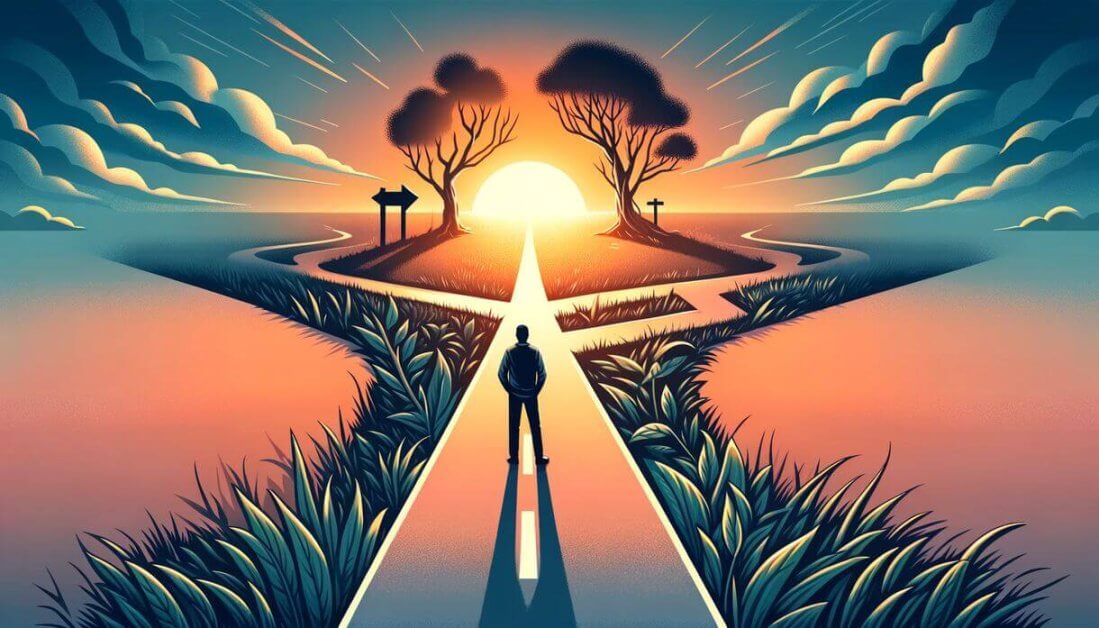
Feel Like a Failure? Good, You’re Normal
If you’ve ever wondered “why do I feel like a failure” this article will show how it is normal and provide ways you can learn to overcome them.

The 3 Best Motivational Books You Need to Read
No matter how much knowledge we have, we all need that extra oomph to get us to through tough challenges. Here are the 3 best motivational books that will give you that extra boost.

5 Powerful Ways to Boost Your Social Skills Today
The success you attain in life depends largely on the strength of your social skills. Here are 5 of the most powerful ways you can boost yours today.

9 Common Symptoms of ADHD
Common symptoms of ADHD can vary tremendously, but often include an inability to focus, irritability, and a poor memory.

3 Must-Read Books To Manage Your Emotions
Emotions stem from the limbic system, an impulsive and primal part of the brain that is extremely powerful. Unfortunately, no one teaches us how to manage emotions, but thankfully these books will.
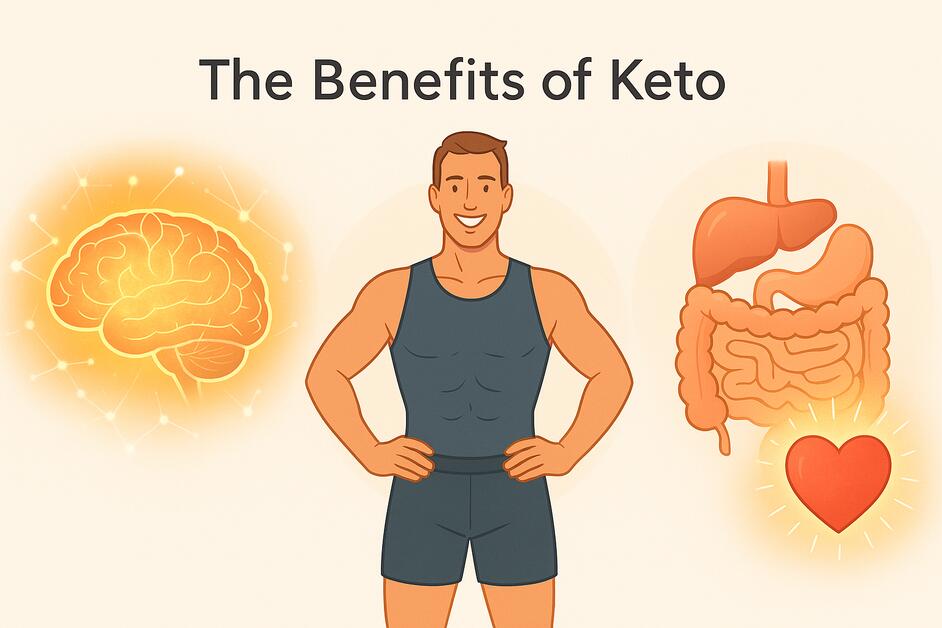
The Benefits of The Ketogenic Diet
The benefits of the ketogenic diet include weight loss, improved energy, and better blood sugar control. It promotes fat burning and mental clarity.
This is really interesting, You’re a very skilled blogger. I’ve joined your feed and look forward to seeking more of your magnificent post. Also, I’ve shared your site in my social networks!